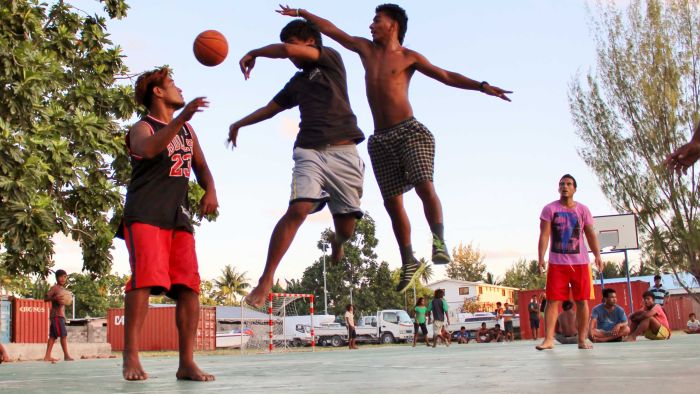
BASKETBALL BLITZ CAPTIVATES KIRIBATI
A sports for development blitz has converted the tiny Pacific nation of Kiribati into a basketball hotspot, and everyone from young kids to office workers are now having hoop dreams.
There may not be a shiny trophy, but victory will be sweet.
Without funds for a winners' cup, community basketball teams from Kiribati's main island Tarawa, are instead deciding to 'bring a plate' to finals day, so a feast of chicken, beef, rice and vegetables awaits the victorious team.
Elsewhere on the island, government workers who've done more lying down than laying up in recent years, are suddenly jumping, shooting and heavy breathing their way through a competitive game of half-court three-on-three.
Barefoot players line up patiently in Teaoraereke Village in the hope they'll get a shot away in the afternoon competition before the sun sets behind the palm trees, while the next morning, in the roofless ruins of an old maneaba or meeting hall, school children learn to scuttle sideways like crabs during a defensive basketball drill.
Basketball is everywhere in Kiribati.
"I am so proud as a Kiribati citizen. I am so proud to see my fellow islanders entertained and involved and playing basketball and other sports," says Hoops for Health coordinator Tekabara Raurenti, who has been crucial to the game's recent spread.
Alongside Tebanimaneka Primary School, in a clearing under the palm trees, lies what might be the most picturesque basketball court on the planet.
Holding court is an effusive Iotia Paul, known to all as Jo. The 34-year-old point guard, who has been a key member of the Kiribati national team since 2003, is explaining the finer points of the game to a couple of dozen sixth graders.
"I try to motivate them," he says.
"I'm just trying to share what I have learned. It makes me fit, active and strong and not just lazy. It brings me a healthy life."
There is growing evidence it is doing the same for many I-Kiribati.
Dr Sam Teeta, a senior dental officer at the Tungaru Central Hospital, has rare insight. He not only sees the state of the health of I-Kiribati every day, he confronts his own.
"I used to play back in high school," he says, nostalgically.
"A basketball court is close to my house but I hardly go there."
That is, until he was roped into the Ministry Tournament which pits government workers from across all sectors against each other in a half-court three-on-three battle for bragging rights.
"For those who haven't had time to play, it gives them the chance to play with other workers.
Dr Sam has since added a bike to his life, and lost a few kilograms.
Health and life expectancy in Kiribati are among the poorest in the Pacific region.
New cases of diabetes increased tenfold in the decade after 1992 and new cases of hypertension almost quintupled over the same period.
While limited space and a lack of funding for quality sports facilities remain a challenge, many villages have been gifted table tennis tables. Volleyball and walk-to-work programs have also been initiated.
"Playing sport is the most important thing," Jo says when discussing his country's attitudes to health.
So sport has become a key weapon in improving health in Kiribati, thanks in part to a basketball blitz from Bonriki to Betio.
Credit: Aaron Kearney, ABC International Development